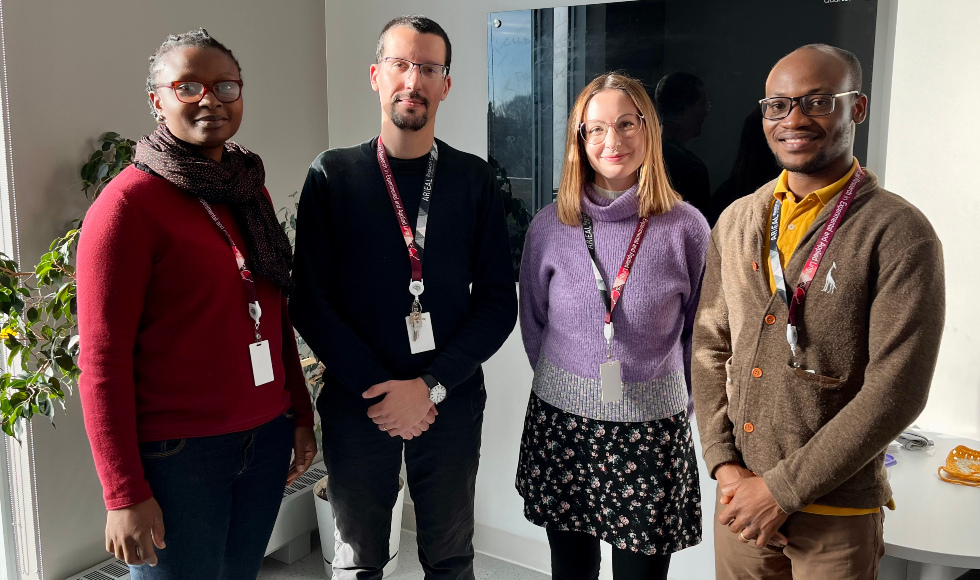International visiting researcher program encourages mutual learning and collaboration

From left to right: Mary Amaechi, Renan Castro Ferreira, Esther Vicente Manzanedo and Felix Kpogo, the four researchers who will be working at McMaster for four months.
BY Sara Laux, Faculty of Humanities
March 8, 2024
A pilot project in the Centre for Advanced Research in Experimental and Applied Linguistics (ARiEAL) is bringing together linguistics PhD candidates and junior academics from around the world to share ideas, conduct research and build lasting international connections.
Four scholars, chosen from more than 40 international applicants, arrived in Canada as International Visiting Researchers at the beginning of January, and will be working at McMaster with ARiEAL researchers for four months.
The four researchers represent a wide range of academic interests and places of origin:
Esther Vicente Manzanedo is originally from Spain, and is completing her PhD at the University of East Anglia in the UK. She is working in the Language, Memory and Brain lab with Elisabet Service, studying language aptitude in multilingual children, and how working memory affects language learning.
Felix Kpogo is working on a PhD at Boston University, looking at under-studied languages spoken in Ghana, such as Akan-Twi and Ga, and the phonetic differences between speakers of the same language. Working with Daniel Pape in the Phonetics Lab, Kpogo is also exploring how children learning their first and second languages navigate the complexities of African languages.
Mary Amaechi is a lecturer at the University of Ilorin in Nigeria, and received her PhD from the University of Potsdam in Germany. She is working with Ivona Kučerová in the Syntax Lab on analyzing aspects of syntax in Lokaa, spoken in southern Nigeria, and Osanyin, which is spoken in a community in north-central Nigeria.
Renan Castro Ferreira is an English-language teacher from Brazil, where he recently received his PhD from the Federal University of Pelotas. Working with Anna Moro in the Bilingualism Lab, Ferreira is exploring cross-linguistic influence, or how language learning is influenced by languages that are already known.
“It has always been part of ARiEAL’s mandates to develop collaborations with scholars from different places, especially those places that are usually underrepresented in Western academia,” explains Kučerová, who is director of ARiEAL.
“We wanted to bring people in to see whether we could learn from each other and start building towards more equitable relationships and long-term collaborations.”
That aligns nicely with McMaster’s wider institutional priorities, says Bonny Ibhawoh, the university’s vice-provost of international affairs.
“We’re not just interested in McMaster’s place in the world – we’re interested in the world’s place at McMaster,” he explains.
“International engagement is core to our strategic mission as a university, and that’s founded on principles of mutual reciprocity, mutual benefits, collaboration and sustainability. These ideas are very well represented in the ARiEAL program: The visiting researchers bring valuable perspectives, and they enrich the research that is happening there. They also learn from our approaches and from the opportunity to contribute to research.”
For the four scholars, who are sharing a house in Dundas, participating in the International Visiting Researcher program has been an opportunity to connect with like-minded colleagues and mentors, and to take advantage of ARiEAL’s resources to further their research.
“I’m focused on telling the story of what understudied languages and communities have to offer when it comes to linguists’ understanding of linguistic universals – because without understanding that, we don’t really have a good sense of what those universals are,” says Kpogo.
“ARiEAL’s work to bring minority communities to the forefront was a really big attraction and something I wanted to jump into.”
“Because of my PhD, I became very interested in neurolinguistics,” adds Manzanedo. “Seeing all the toys to play with here is very exciting!”
And while all are adjusting to the weather — they arrived during a particularly cold couple of weeks — they say that while the air may be cold, the welcomes have been warm.
“Being from Brazil, I expected that people wouldn’t be quite so warm, but actually, people have been very welcoming,” says Ferreira.
“People say good morning to you as you go by. And as an English-language teacher, it’s been great for me to be immersed in an English-speaking environment.”
“We’re grateful to ARiEAL,” says Kpogo. “Getting this kind of exposure as grad students or postdoctoral researchers is a huge plus – not many people have this kind of opportunity. This kind of recognition positions you to really aspire to better things.”


